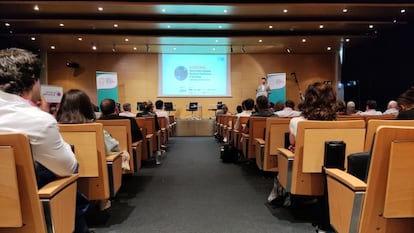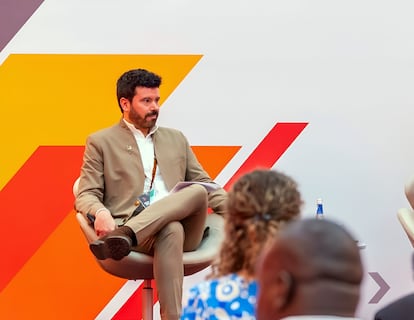The mystery of the huge global summit in Barcelona that nobody knows anything about
An association called SciTech DiploHub sent out a news release about a historic event that attracted 1,300 world leaders, including ministers, Nobel laureates and a Jordanian princess. The only problem is, it never took place

A striking press release reached the media on July 10 with details about a historic event that had just taken place. “More than 1,300 global leaders, including science ministers, secretaries of state, Nobel laureates, technology and pharmaceutical company executives, and ambassadors from nearly 100 countries have gathered in Barcelona for the World Summit on Science Diplomacy,” said the press release, sent from an email account of SciTech DiploHub, a small Barcelona-based association dedicated to scientific diplomacy (establishing scientific links between countries and organizations). The statement celebrated the fact that none other than the Director-General of the United Nations Educational, Scientific and Cultural Organization (UNESCO), Audrey Azoulay, had announced at this event that the Catalan city would be the venue for this momentous annual congress until 2028. The news quickly made its way into several Spanish newspapers, such as La Razón and El Español. The only problem is that this momentous global event never actually took place.
An official UNESCO spokesperson, speaking from the organization’s headquarters in Paris, was shocked to hear about it. “This summit simply did not take place. UNESCO was therefore not involved in any way and our Director-General never attended or made any statements there. We are trying to figure out how this false information emerged and was spread.”
This major global summit allegedly took place between July 5 and 10. The press release included statements by Alexis Roig, the CEO of SciTech DiploHub. “The fact that Barcelona is the city where the social, ethical and diplomatic implications of the management and governance of science and new technologies are being debated puts our research and innovation ecosystem at the forefront. It is no coincidence that this week everyone has been talking about Barcelona and this summit as the ‘Davos’ of science and technology,” Roig proclaimed in the release. The statement further claimed that “47 scientific academies, more than 50 universities and 20 leading companies in technology and life sciences” had participated.
Despite its apparently colossal dimensions, no institution consulted by EL PAÍS knows anything about this world summit. A spokesperson for the European Commission office in Barcelona explained that her institution “has not participated in, organized, or been aware” of this supposed event, despite the fact that the EU logo appeared among the co-organizers. The Spanish Ministry of Science is also not aware of there having been a massive congress with Nobel laureates and ministers, according to an official spokesperson.
The explanations provided by the CEO of SciTech DiploHub are confusing. In a telephone conversation on July 23, Alexis Roig told this newspaper that the press release was false and that someone had sent it from an official association email, perhaps out of revenge. “We think it is someone who has worked with us in the past and that it is a vendetta, but that is very easy to say. Who was it? How? Why?” he said.

However, on June 14 Roig himself had sent out invitations bearing his signature to a multitude of ambassadors and leading figures in Spanish science, asking them to attend the so-called “High-Level Closing Plenary Session of the World Summit on Science Diplomacy,” which would be held on the morning of July 5 at the auditorium of Barcelona Activa, the economic development agency of the City of Barcelona. In those invitations, Roig announced that this future event would welcome “more than 1,300 world leaders,” including “renowned researchers and scientists, business leaders from the technology and life sciences industries, Nobel Prize winners, political representatives, ministers and secretaries of state from more than 90 different countries.”
Asked about this contradiction — claiming that the press release sent to the media after the summit was false even though the invitation from a month earlier contained similar information — Roig changed tack and said that the massive congress did in fact take place. “The 1,300 participants were not all there in person, there were about 400 of them in person,” he said. According to his version of events, two Nobel Prize winners and a minister attended, but he was unable to come up with their names over the phone. Roig promised to provide their identities in writing on July 23, but has not yet done so, despite this newspaper’s insistence.
Two days after the telephone conversation with EL PAÍS, on July 25, SciTech DiploHub sent a new press release to the media, in which it asked the newspapers that had published information about the world summit to publish a correction. The new press release no longer mentioned 1,300 world leaders, or even 400, but rather “around a hundred personalities” as well as “a strong online following.” There was no more mention of the Director-General of UNESCO nor of Princess Sumaya bint El Hassan of Jordan, who both appeared as attendees in the July 10 release, with statements included.
This summit simply did not take place. UNESCO was therefore not involved in any wayUNESCO official spokesperson
Following the telephone conversation with Alexis Roig, this newspaper sent him 11 written questions on July 23, asking for photographs of the supposed world summit, names of the world leaders who attended, and details about its financing. After almost a week of silence despite three reminders, Roig’s association sent the following reply on Monday: “Measures have already been taken against the people who acted in a wrong or malicious manner, none of whom have any ties to our organization any longer.”
Roig said by telephone that one of the venues for the world summit had been Pompeu Fabra University. An official spokeswoman has denied this. “The only activity in connection with SciTech DiploHub that Pompeu Fabra University has hosted are some of the activities of the Summer School of the Barcelona Institute of International Studies (IBEI), which took place from June 30 to July 5, with a total of 23 registered participants,” said the spokeswoman. “Other than this, no other relevant event or visit by senior officials took place at Pompeu Fabra during the month of July,” she underscored.
One of the 23 people who signed up for this course on scientific diplomacy —co-organized by SciTech DiploHub and the IBEI— explains that he paid €1,600 ($1,731) to listen to talks by Alexis Roig himself and by 15 speakers, among whom the most prominent international figures were Amna Baloch, Pakistan’s ambassador in Brussels, and Archana Sharma, an Indian physicist who works at the European Organization for Nuclear Research (CERN) in Geneva. There were no ministers, no Nobel laureates, and no princesses. These same speakers were the leading figures of the so-called “High-Level Closing Plenary Session of the World Summit on Science Diplomacy” on July 5, which was attended by the students of the summer school and dozens of other attendees, inside the auditorium of Barcelona Activa. The participant who spoke with this newspaper recalls that he asked himself: “There’s been a world summit here and we didn’t know about it?”
Alexis Roig founded the SciTech DiploHub association in 2018. On his social media accounts he presents himself as “Barcelona’s chief science and tech envoy.” An official spokesperson for the City of Barcelona, however, underscored that Roig is not the city’s chief envoy “under any circumstances.” In 2023 the city awarded a grant of €10,500 to SciTech DiploHub to organize a World Summit on Science Diplomacy, but the grant was later revoked because the association did not submit the required supporting documents. “At this time, the City has no relationship with the association or the promoter of the event,” the spokesperson reported.
The same municipal source acknowledges that city officials did allow the use of the Barcelona Activa auditorium for the so-called “High-Level Closing Plenary Session of the World Summit on Science Diplomacy” on 5 July. “As a City Council, we received a request to provide space and we did so, as we do with many other entities that hold events in the city. Likewise, we were asked to participate in the closing ceremony and an exec [Jaume Baró, executive director of Business and Entrepreneurship at Barcelona Activa] participated in it, not an elected official,” adds the spokesperson.
Five industry experts consulted by EL PAÍS said that Alexis Roig has a reputation for hyperbolically exaggerating his own results. One of these experts is Yoran Beldengrün, a Swiss consultant based in Barcelona who specializes in science diplomacy in the Palestinian-Israeli conflict. “SciTech DiploHub never ceases to amaze me with the incredible initiatives it pulls out of its magic hat, but this time the trick was clearly an illusion. The question to ask the magician is not how he did it, but why he did it so badly,” says Beldengrün. “As a Swiss citizen living in Barcelona, I would be the first to welcome a Davos of science and technology to the city, but first we have to make sure that the conditions and needs exist to organize an event of that scope. The World Economic Forum in Davos employs 800 people, has revenues of more than €400 million and has existed for more than 50 years,” he explains.
Sign up for our weekly newsletter to get more English-language news coverage from EL PAÍS USA Edition
Tu suscripción se está usando en otro dispositivo
¿Quieres añadir otro usuario a tu suscripción?
Si continúas leyendo en este dispositivo, no se podrá leer en el otro.
FlechaTu suscripción se está usando en otro dispositivo y solo puedes acceder a EL PAÍS desde un dispositivo a la vez.
Si quieres compartir tu cuenta, cambia tu suscripción a la modalidad Premium, así podrás añadir otro usuario. Cada uno accederá con su propia cuenta de email, lo que os permitirá personalizar vuestra experiencia en EL PAÍS.
¿Tienes una suscripción de empresa? Accede aquí para contratar más cuentas.
En el caso de no saber quién está usando tu cuenta, te recomendamos cambiar tu contraseña aquí.
Si decides continuar compartiendo tu cuenta, este mensaje se mostrará en tu dispositivo y en el de la otra persona que está usando tu cuenta de forma indefinida, afectando a tu experiencia de lectura. Puedes consultar aquí los términos y condiciones de la suscripción digital.









































